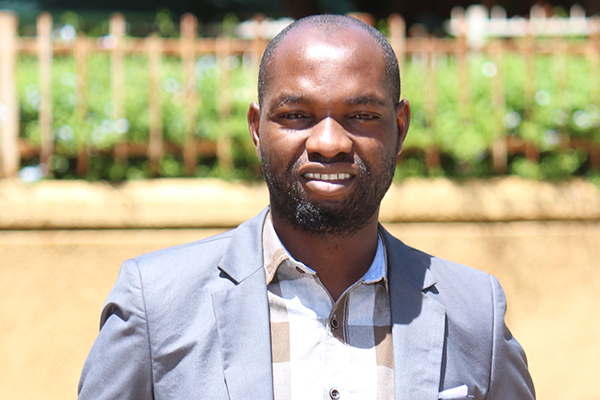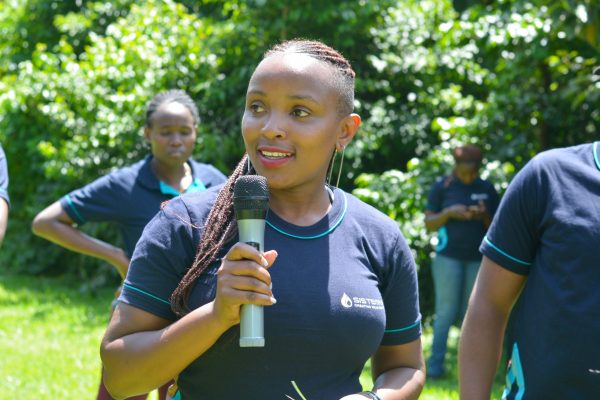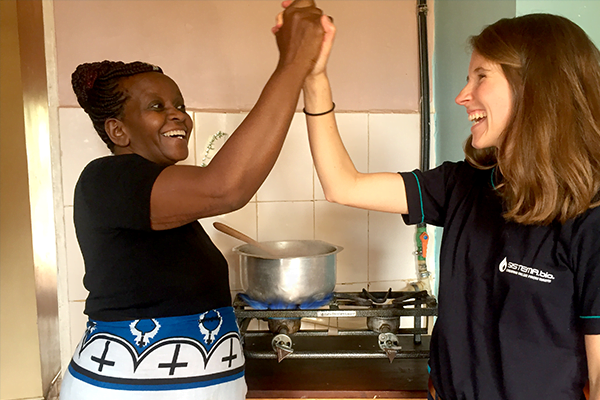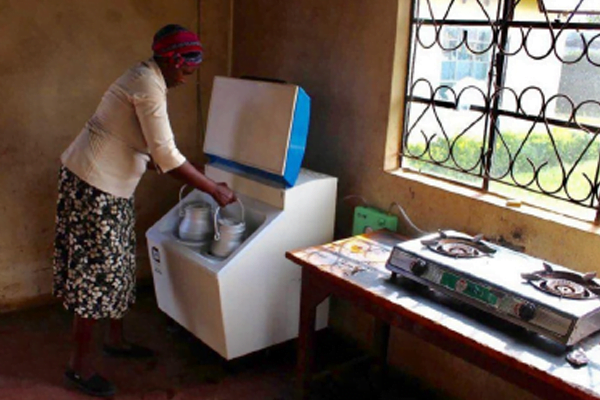
With the support of the EEP, SNV and SimGas have developed the first micro-scale biogas-powered milk chiller to increase income of smallholder dairy farmers and to eliminate milk spoilage. In 2018 the micro-scale biogas-powered milk chillers will be widely distributed in East Africa.
The problem
Demand for milk is rapidly outpacing supply in developing Africa and Asia. Food loss and food waste along the agriculture supply chains is a major problem in the developing world and the newly industrialised countries. The dairy industry in East Africa is emerging, increasingly contributing to the countries’ GDP and supporting the livelihoods of more than two million smallholder farmers. The dairy sector is crucial for rural development, poverty reduction and food security.
Lacking cold chain facilities, however, slows further development as many farmers simply live too far away from the market to deliver their (evening) milk before it spoils. Raw milk is not cooled at farm level and as a result, milk does not survive the heat overnight. Upon delivery the next morning, the low quality milk is rejected by collection centers. Consequently, the resulting post-harvest milk losses, in terms of opportunity cost, at farm level are estimated at 30-40% (FAO, 2003) and 85% of the produced milk does not reach the formal market (IFC, 2014). This limits the supply of raw milk to the milk processors, which are operating at low utilisation rates due to shortages in milk supply.
The reason for the shortages in milk supply is twofold: 1) 85% of rural East Africa lacks access to a reliable power grid, and 2) no cooling solutions are available to farmers with up to 10 dairy cows, who represent 85% of all dairy farmers in East Africa. This leaves a huge opportunity to close the supply-demand gap for milk at the source, while increasing income for dairy farmers.
The solution
The solution lies in small-scale off-grid milk cooling at farm level using a reliable and renewable energy source: biogas produced from cow manure. The cooling system in the Biogas Milk Chiller is powered by biogas, generated by digesting cow manure in a biogas digester. The value proposition for farmers is to increase their income from milk, by selling evening milk and by minimizing the risk of milk rejection, or save time and money on milk transport. This bottom-up approach is new to the dairy industry in developing countries; instead of focusing on the top of the cold chain – the processors – SNV and SimGas focused on filling the gap at the bottom, where the problem of milk loss originates: at the dairy farms. Their dream is that by 2025, milk spoilage generated by off-grid dairy farmers will be something of the past and that the Biogas Milk Chiller shall be a widely accepted link in the cold chain for emerging dairy sectors worldwide.
The success
With the support of the EEP, Biogas Milk Chillers have been installed throughout Tanzania and Kenya and the project has demonstrated the unique design, reliable technology and viability of the business case of SimGas. In 2016, SNV and SimGas completed testing of 15 working prototypes in two regions in Tanzania and Kenya. These units proved that the new technology enables 10L of milk to be cooled from 350C to 40C off-grid and within three hours (compared to 21 hours using an electric refrigerator). Remote sensing technology was paired with user feedback sessions to assess the performance and to monitor the impact of the field test prototypes. In parallel, the team investigated the market potential and assessed customer needs through partnering with local dairy cooperatives and approaching smallholder farmers directly.
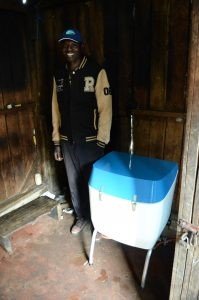
This is Paul Macharia. He is a model dairy farmer for Kenya’s largest dairy processor, Brookside. Often other farmers visit his farm to learn from his dairy farming practices. To store evening milk, he put milk cans in water baths, which he had to refresh every two or three hours during the night. Milk rejections were still frequent.
SimGas installed a biogas digester and a biogas milk chiller at his farm. He now simply places the cans with evening milk inside the chiller and the machine does the rest. The following morning he takes the can with chilled milk out of chiller and delivers it to the collection center, together with his morning milk. The dairy cooperative now praises him for the additional quantity and improved quality of his milk.
With the milk chiller they (the dairy cooperative) say my milk is better than the milk of the rest!
The scale-up
The successful prototype phase and the fruitful consortium of the partners SNV, Mueller and BoPInc has resulted in a scale up of the project. SimGas is now equipped to provide 750 Biogas Milk Chillers to smallholder dairy farms in East Africa in 2018. The aim is to prove that cooling milk on biogas is an efficient and affordable way to combat milk spoilage.
Read more about SimGas >>
Building a Start-up at the Nexus of Energy and Food
Profile of Admore Chiumia, Founder of Green Impact Technologies - Malawi...
Technical Approaches to Connecting Communities
Profile of Madrin Maina, Technical Operations Manager East Africa at Sistema.bio...
Fighting Injustice by Reducing Climate Change
Profile of Esther Altorfer, East Africa Managing Director of Sistema.bio...



